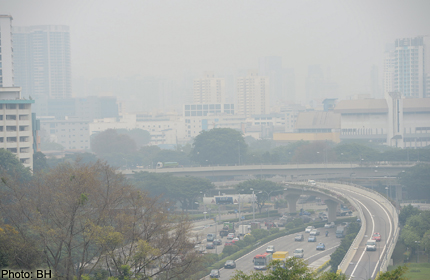
KUALA LUMPUR - Indonesia said Wednesday it hopes to ratify a regional treaty by early next year to fight smog from forest fires that bring misery to millions in the region.
"We hope we can ratify the agreement by the end of the year or early next year," the country's Environment Minister Balthasar Kambuaya told reporters.
Earlier Wednesday Kambuaya and environment ministers from four other ASEAN countries that form the Southeast Asian bloc's "haze committee" met to discuss ways to prevent the Indonesian forest fires.
The blazes on Sumatra island, which are started to clear land for cultivation, left neighbouring Singapore and Malaysia choking in June on the worst haze in more than a decade.
The air pollution scared off tourists, forced schools to close and caused a rise in respiratory illnesses.
Indonesia is the only member of the Association of Southeast Asian Nations which has still not ratified the bloc's Agreement on Transboundary Haze Pollution brokered in 2002.
The treaty aims to stop cross-border smog from forest fires by requiring parties to prevent burning, monitor prevention efforts, exchange information and provide mutual help.
It also binds signatories to "respond promptly" to requests for information from another country hit by the smoke, and to take steps to implement their obligations under the treaty.

Indonesia, a freewheeling democracy since the fall of strongman Suharto in 1998, has blamed its parliament for the long delay.
Jakarta had sought legislators' approval to ratify the haze agreement but the proposal was rejected in 2008.
The pact has been submitted again to the legislature.
The ministers on Wednesday warned that haze could be expected until the end of the southwest monsoon season in October if there was an increase in hotspots.
Kambuaya said Jakarta was prepared to share concession maps of fire-prone areas with other governments, but they would not be made available to the public as Singapore had asked.
"We are not allowed to publish concession maps to the public," he said.
The concession maps show who has the right to plant crops or log a particular tract of land, allowing them to be investigated and prosecuted for fires.
The Sumatra fires have been largely blamed on palm oil firms using the illegal but cheap method of burning vast tracts of rainforests and peat lands to clear them for planting.
Indonesia is the world's top producer of palm oil, which is used for many everyday items ranging from soap to biscuits.

